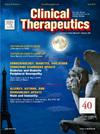COVID-19感染实体器官移植中尼马替韦/利托那韦处方不当:一项多中心回顾性研究
IF 3.2
4区 医学
Q2 PHARMACOLOGY & PHARMACY
引用次数: 0
摘要
研究背景:Nirmatrelvir-ritonavir (NR)在严重急性呼吸综合征冠状病毒2型感染的实体器官移植受者(SOTRs)中显示出阻止严重冠状病毒病2019 (COVID-19)进展的有效性。然而,它有广泛的相互作用,特别是与免疫抑制剂。本研究旨在综合评价新冠肺炎SOTRs患者NR及免疫抑制剂的不合理处方,同时突出其本质方面。方法:我们纳入了2022年12月至2023年6月期间在五家三级医院接受NR的住院sotr,并对其处方进行评估。结果:共纳入211例患者,其中不符合处方标准的患者205例(97.16%)。用药不适宜主要为发病后超过5 d(87.68%),其次为重症至危重症患者(52.13%),根据肾功能判断用药不适宜(47.87%)。重度肾功能损害患者禁忌症占17.06%,药物相互作用禁忌症占5.69%。不适当恢复使用免疫抑制剂的比例大于不适当停药或调整剂量的比例(30.16% vs 8.99%)。超过三分之一的患者忽略了监测浓度。约8%出现异常高浓度。结论:住院sotr患者NR处方不当现象普遍存在。根据患者的肾功能调整剂量,注意免疫抑制药物的同时使用,治疗药物监测是必要的。临床医生应提高警惕和重视。本文章由计算机程序翻译,如有差异,请以英文原文为准。
Inappropriate Prescribing of Nirmatrelvir/Ritonavir in Solid Organ Transplantation With COVID-19 Infection: A Multicenter Retrospective Study
Background
Nirmatrelvir-ritonavir (NR) has demonstrated effectiveness in halting the progression to severe coronavirus disease 2019 (COVID-19) among solid organ transplant recipients (SOTRs) infected with Severe Acute Respiratory Syndrome Coronavirus 2. However, it has a wide range of interactions, especially with immunosuppressants. The study aimed to comprehensively evaluate the Inappropriate prescribing of NR and immunosuppressants in SOTRs with COVID-19, while also highlighting the essential aspects.
Methods
We included hospitalized SOTRs who received NR at five tertiary hospitals between December 2022 and June 2023, and evaluated their prescription.
Results
A total of 211 patients were enrolled, of which 205 did not meet all criteria for appropriate prescribing (97.16%). Inappropriateness primarily stemmed from starting treatment more than 5 days after symptom onset (87.68%), followed by application in severe-to-critical cases of COVID-19 (52.13%), the inappropriate dosages based on renal function (47.87%). Contraindications encompassed 17.06% of patients with severe renal impairment and 5.69% with contraindicated drug interactions. Inappropriate resumption of immunosuppressants accounted for a larger proportion than inappropriate discontinuation or dose adjustment (30.16% vs 8.99%). More than one-third of patients neglected to monitor concentrations. About 8% experienced abnormal high concentrations.
Conclusion
Inappropriate prescribing of NR is widespread among hospitalized SOTRs. Adjusting doses based on patients’ renal function and paying attention to concurrent use of immunosuppressive drugs are crucial, and therapeutic drug monitoring is necessary. Clinical practitioners should enhance their vigilance and attention.
求助全文
通过发布文献求助,成功后即可免费获取论文全文。
去求助
来源期刊

Clinical therapeutics
医学-药学
CiteScore
6.00
自引率
3.10%
发文量
154
审稿时长
9 weeks
期刊介绍:
Clinical Therapeutics provides peer-reviewed, rapid publication of recent developments in drug and other therapies as well as in diagnostics, pharmacoeconomics, health policy, treatment outcomes, and innovations in drug and biologics research. In addition Clinical Therapeutics features updates on specific topics collated by expert Topic Editors. Clinical Therapeutics is read by a large international audience of scientists and clinicians in a variety of research, academic, and clinical practice settings. Articles are indexed by all major biomedical abstracting databases.
 求助内容:
求助内容: 应助结果提醒方式:
应助结果提醒方式:


